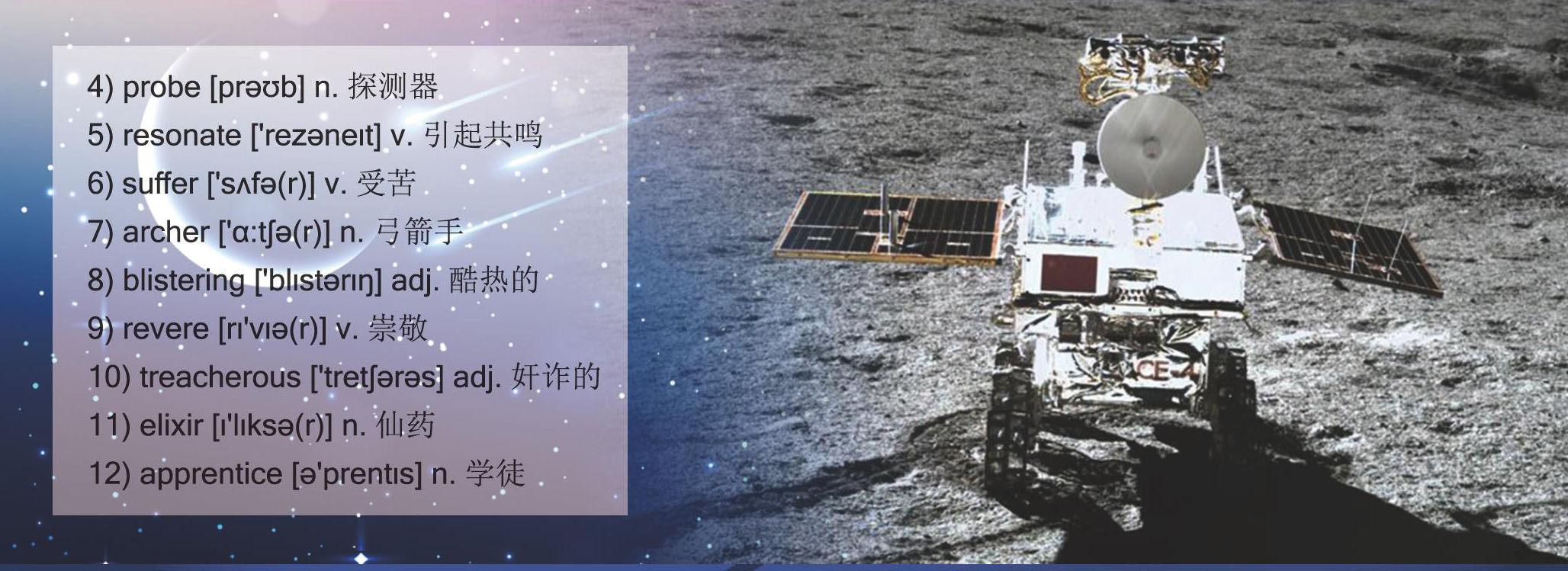A Chinese Myth BehindNaming Chinese LunarExploration Program 中国探月工程命名的由来
Juno


從古至今,中国人对月亮有过无数浪漫想象。2004年,中国探月工程正式立项,.从嫦娥一号升空,到嫦娥五号携月壤返回,中国人一步步将“上九天揽月”的神话变为现实。嫦娥,这是我们耳熟能详的神话传说故事人物,而现在也是中国航天项目和设备的名称,是独属于中国航天的名字,也是独属于中国人的浪漫。航天设备使用神话人物命名,不仅表现出了中国传统文化的博大精深,更是一种符合时代特色的产物。
China's Lunar Exploration Program(CLEP), also known as the Chang'e Program,is a program undertaken by the China National Space Administration(CNSA). As earlyas in 1991, Chinese space scientists proposed the project of lunar exploration. Theyput together the three-stage plan of "Orbiting, Landing and Returning" in 2004.
The first is orbital mission, simply reaching lunar orbit, a task completed byChang'e 1 on October 24, 2007. The second is soft lander, landing and 3)roving onthe Moon, as Chang'e 3, the spacecraft was successfully launched on December 2,2013. The third is return mission, collecting lunar samples from the near-side andsending them to Earth. The return capsule of China's Chang'e-5 probe touched downon Earth on December 17th 2020, bringing back the country's first samples collectedfrom the moon.
It seems that for thousands of years, Chinese people had longed to go to the moon,and the dream are coming true.
For Chinese people, "Chang'e" the name of Chinese lunar probe is a householdname and easy to 5)resonate with. It all because that this name came from a famousChinese myth and later have been written in ancient classic and poems often times. Themyth has many versions and now we are going to share the most popular one with you.
It is said that long ago there used to be 10 suns shining in the sky. The crop wasdrying and people 6)suffered a lot. There was a powerful 7narcher named Hou Yi, whohad great sympathy for people's sufferings from the 8)blistering weather and decided tohelp them out. Hou Yi climbed up to the summit of Kunlun Mountains, and shot down ninesuns, leaving only one to benefit people. After he shot down the suns, Hou Yi became ahero who was 9)revered by local people.
Hou Yi was so famous for his perfect archery skills, so many people became followersof him and learned from him. A man named Pang Meng who was 10)treacherous andgreedy was among them.
Later, Hou Yi married a beautiful girl—Chang'e. The young couple lived a happy andsweet life. One day, the Queen Mother of the West gave Hou Yi an 1Ielixir. This elixircould help people who drank it ascend to heaven and become immortal. However, Hou Yiwas not willing to leave his wife Chang'e alone on the earth, so he gave her the elixir forsafekeeping.
Unfortunately, Pang Meng found this secret and made a plan to steal it. On themorning of a 15th day of an 8th lunar month, when Hou Yi and other 12)apprentices wentout for hunting, Pang pretended to fall ill and stayed at home. After they left, Pangforced Chang'e to give him the elixir. Chang'e, knowing that she could not defeat Pang,13)swallowed the elixir herself, and immediately she felt herself floating up and flied tothe sky.
Hou Yi came back and didn't see Chang'e. He went outside and found that themoon was extremely clean and bright that night, and that there was a moving figurelike Chang'e in the moon. Hou Yi 14)desperately tried to catch up with the moon, butonce he chased forward, the moon went back, so he could never catch up. Hou Yi thenasked servants to set a table in his back garden and with his wife's favorite snacks andfruits on it, looking forward to meet and reunite with Chang'e. From then on, the customof worshipping the moon on the Mid-Autumn Festival began to spread in China.
The Chinese nation has always attached great significance to the inheritance anddevelopment of its own fine traditional culture, like name China's Lunar ExplorationProgram as the Chang'e Program, a fusion ofChina's past and future in thescientific community.Outstanding Chinese scientists in the long sweepof history not only show their scientific spirit ofexploration, adventure and pursuing the truth butalso share profound humanistic care and historicalvision.
中国探月工程,也称“嫦娥工程”,是国家航天局启动的探月工程。早在1991年,中国航天专家提出开展月球探测工程。2004年制定了“绕、落、回”三个阶段的实施计划。
第一阶段是轨道任务,即简单地到达月球轨道。嫦娥一号于2007年10月24日成功发射。第二阶段是软着陆,即在月球上着陆和漫游。2013年12月2日,嫦娥三号成功发射升空。第三个阶段是返回。即采集月球样本并将其送至地球。2020年12月17日,嫦娥五号返回器携带月球样品着陆地球。
几千年来,中国人似乎一直渴望登月,而现在梦想正照进现实。
对于中国人来说,“嫦娥”——中国月球探测器之名是家喻户晓的名字,很容易引起共鸣,因为这个名字来自一个中国著名的神话传说,后来被写进古代经典著作和诗歌中。这个神话故事衍生了很多不同的版本,现在一起来了解下最常见的这个版本吧。
据说很久以前,天空中曾经有十个太阳同时出现。庄稼干涸了,人们遭受了很大的痛苦。有一个强大的弓箭手叫后羿,他对遭受酷热天气折磨的人表示深切的同情,并决定帮助他们摆脱困境。后羿爬上昆仑山的山顶,射下九个太阳,只留下一个造福人民。射下太阳后,后羿成为一位受到当地人崇敬的英雄。
因为后羿高超的射箭技巧,很多人向他拜师学艺。有个叫逢蒙的人,为人奸诈贪婪,也随着众人拜在后羿的门下。
后来,后羿娶了一个漂亮的女孩——嫦娥,他们过着幸福甜蜜的生活。一天,作为对他壮举的奖励,西王母送给后羿一丸仙药。据说,吃了这种药,不但能長生不老,还可以升天成仙。可是,后羿不愿意离开嫦娥,所以他把仙药交给嫦娥保管。
可惜逢蒙发现了这个秘密,并密谋偷取仙药。农历八月十五的一天早晨,后羿要带弟子出门打猎,逢蒙假装生病留了下来。他们走后,逢蒙闯进后羿家里,威逼嫦娥把仙药交出来。知道自己无法打败他,嫦娥立刻吞下了仙药。她一吞下它,就飘飘悠悠地飞了起来,一直朝着月亮飞去。
后羿外出回来,不见妻子嫦娥。他冲出门外,只见当晚的月亮非常皎洁明亮:月亮上有一个像嫦娥一样的动人身影。后羿拼命想追上月亮,但是一旦他向前追,月亮就往后退,所以他永远赶不上月亮。后来,后羿让仆人在他的后花园摆一张桌子,桌上放着他妻子最喜欢的零食和水果,盼望与嫦娥相见。从此,中秋节拜月习俗开始在中国流传。
中华民族历来十分重视自身优秀传统文化的传承和发展,例如命名中国的探月工程为嫦娥工程,这也是中国的过去与未来在科学界的融合。杰出的中国科学家在漫长的历史长河中,不仅展现了他们的科学探索精神、冒险精神和追求真理的精神,而且有着深厚的人文关怀和历史眼光。

